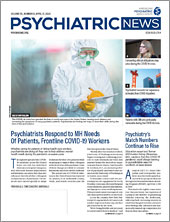For most physicians, the needs of the individual patient in their office or clinic is the focus of their attention. But outside the setting of that single patient encounter is a larger community of patients in need, their families, and individuals who may later need care.
Even in the best of times, there may be a tension between a physician’s ethical obligations to the individual patient and to the broader public. During a global pandemic such as COVID-19, that tension has been heightened and may come into play in many clinical scenarios, according to Rebecca Brendel, M.D., J.D., chair of the APA Committee on Ethics. She is director of the master’s degree program at the Harvard Medical School Center for Bioethics and a member of the AMA Council on Ethical and Judicial Affairs.
“For most of us, in our practices, what we are most commonly thinking about is the single patient before us,” she told Psychiatric News. “Now we are in the midst of an enormous public health crisis, and as physicians we have an ethical obligation to think as well about the greater good.”
She outlined two specific clinical scenarios that are liable to be common and in which the competing ethical obligations to patients or public health may be at play:
•
Prescriptions and hoarding of medicines: Patients are bound to be anxious about having an adequate supply of their medications during a period when pharmacies are deluged and may experience shortages. These patients may be inclined to request bulk quantities. Psychiatrists should be certain their patients have an adequate supply of their medications (taking into account whether the risk of suicide exists), but Brendel advised that psychiatrists avoid prescribing refills that could lead a patient to hoard medications. “One way we can be absolutely sure there will be shortages of medications is by not thinking cautiously about how we prescribe.”
(Reimbursement for multiple months of prescriptions varies with health plans; many plans cover a maximum of a 60- or 90-day supply, but physicians could theoretically write scripts for even longer, and mail-order pharmacies could auto-fill them; moreover, some patients might be willing to pay out of pocket for extra supplies.)
Psychiatrists can allay patient concerns by helping them think of alternative sources for prescriptions—such as larger mail-order pharmacies—if their local pharmacies are in short supply. Additionally, psychiatrists should talk to patients about planning ahead and not waiting until they are about to run out of a medication to request a refill.
•
Social distancing and scheduling appointments: Psychiatrists and mental health professionals are likely to have patients who prefer, expect, and may even insist upon face-to-face visits. “In normal times, psychiatrists have an obligation to put their patients’ needs and wants first and to accommodate them within established clinical boundaries to the best of their ability,” Brendel said. “We are not in normal times. Data very clearly show that the best way to contain the spread of COVID-19 is social distancing and that person-to-person contact is the major source of spread of the virus. Telephone and tele-video consultations may not be ideal in the course of routine care, but in the current circumstances, they are essential.”
APA members are bound by the ethical code of the medical profession, specifically defined in APA’s Principles of Medical Ethics With Annotations Especially Applicable to Psychiatry. The AMA Code of Medical Ethics states: “Physicians’ primary ethical obligation is to promote the well-being of individual patients. Physicians also have a long-recognized obligation to patients in general to promote public health and access to care. This obligation requires physicians to be prudent stewards of the shared societal resources with which they are entrusted. Managing health care resources responsibly for the benefit of all patients is compatible with physicians’ primary obligation to serve the interests of individual patients.”
Additionally, the AMA has created an ethics resource, “AMA Code of Medical Ethics: Guidance in a Pandemic,” which offers guidance to these questions and others relevant to the public health emergency. The resource includes discussions of ethical challenges particular to the COVID-19 response.
Finally, an overarching priority for psychiatrists—and all physicians and health care workers—is to be mindful of their own health—for their own sake and the sake of their families, but also for the greater good. For health care professionals of all kinds, the current situation requires “all hands on deck.”
“Psychiatrists have a personal but also a professional responsibility to be healthy and available in this extraordinary new circumstance,” Brendel said. ■
Resources for psychiatrists about COVID-19 are posted on the
APA website.
Principles of Medical Ethics With Annotations Especially Applicable to Psychiatry is posted
here.
“The AMA Code of Medical Ethics: Guidance in a Pandemic” is posted
here.

